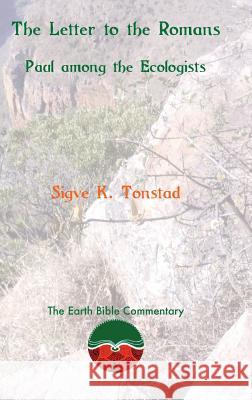The Letter to the Romans: Paul Among the Ecologists » książka
The Letter to the Romans: Paul Among the Ecologists
ISBN-13: 9781910928028 / Angielski / Twarda / 2016 / 452 str.
The Letter to the Romans: Paul Among the Ecologists
ISBN-13: 9781910928028 / Angielski / Twarda / 2016 / 452 str.
(netto: 384,10 VAT: 5%)
Najniższa cena z 30 dni: 398,84
ok. 16-18 dni roboczych.
Darmowa dostawa!
'What God has joined together, let no one put asunder' is a motto for this commentary. Against a prevailing theological tradition that God's compassion is for human beings only and not also for non-human creation and the earth, Tonstad raises his voice in protest. The 'sundering' omissions are so monumental that only a renewed reading of Romans from the ground up can hope to undo them. If we read Romans through the eyes of Tonstad, Paul will be found to be speaking about the faithfulness of Christ and not only about faith in Christ; to be describing sin in societal terms and not only as a problem of individuals; his enigmatic 'I' in Romans 7 can be understood as telling the story of Eve and not only rehashing his own biography; and Paul will be seen to give voice to non-human creation and the earth to a degree that is elsewhere heard in the Bible only in the Old Testament and, of course, hardly ever in the pulpit or the seminary. The theology of Romans will turn out to be an inclusive theology of divine compassion rather than a theology of divine sovereignty, arbitrarily exercised. On the theological foundation of compassion, Paul outlines an ethical vision of compassion in human community, with regard to citizenship and government, and in the mixed fellowship of Jews and Gentiles in the house churches in Rome. Paul's ecological bona fides are inseparable from his theological vision and not an imposition from without; his call to mercy blends with the best and most urgent sentiments of contemporary ecologists. In the striking reciprocity between theology and ecology in Romans, Paul puts on display what God has joined together, and, better still, what God has done to join together all that is asunder.
What God has joined together, let no one put asunder is a motto for this commentary. Against a prevailing theological tradition that Gods compassion is for human beings only and not also for non-human creation and the earth, Tonstad raiseshis voice in protest. The sundering omissions are so monumental that only a renewed reading of Romans from theground up can hope to undo them. If we read Romans through the eyes of Tonstad, Paul will be found to be speaking about the faithfulness of Christ and not only about faith in Christ; to be describing sin in societal terms and not only as a problem of individuals; his enigmatic I in Romans 7 can be understood as telling the story of Eve and not only rehashing his own biography; and Paul will be seen to give voice to non-human creation and the earth to a degree that is elsewhere heard in the Bible only in the Old Testament and, of course, hardly ever in the pulpit or the seminary.The theology of Romans will turn out to be an inclusive theology of divine compassion rather than a theology of divinesovereignty, arbitrarily exercised. On the theological foundation of compassion, Paul outlines an ethical vision of compassion in human community, with regard to citizenship and government, and in the mixed fellowship of Jews and Gentiles in the house churches in Rome. Pauls ecological bona fides are inseparable from his theological vision and not an imposition from without; his call to mercy blends with the best and most urgent sentiments of contemporary ecologists.In the striking reciprocity between theology and ecology in Romans, Paul puts on display what God has joined together, and, better still, what God has done to join together all that is asunder.











